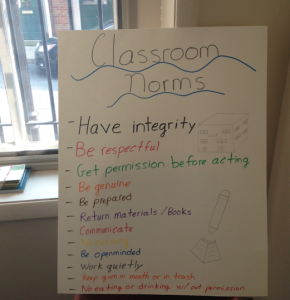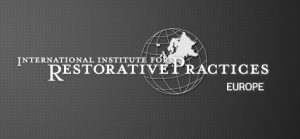News & Announcements
- Details
- Written by Joshua Wachtel
An article titled "The Use of Restorative Practices as a Strategy for Closing the School-to-Prison Pipeline" by IIRP Assistant Professor and Director of Continuing Education Dr. John Bailie has just been published in Race, Law, and Justice: Strategies for Closing the School-to-Prison Pipeline, a series of articles as a follow-up to a symposium held in February 2013 by the District Attorney's office of Kings County, New York, and Medgar Evers College, City University of New York. Bailie's piece is printed below. The entire journal, which includes an array of articles looking at many relevant issues and perspectives on race, zero tolerance and alternatives like restorative justice, may be downloaded for free.
- Details
- Written by Joshua Wachtel
The following is an audio interview, and a transcription, with Margaret Murray, author of Forging Justice: A Restorative Justice Mystery, published in September 2013 and available now in the IIRP Book Store.
Joshua Wachtel: Welcome, I have Margaret Murray on the line. She’s the author of a new book, Forging Justice: A Restorative Justice Mystery. She’s also the librarian at the IIRP, and a 2013 graduate of the IIRP Graduate School. Welcome, Margaret.
- Details
- Written by Joshua Wachtel
It has become a tradition in Canada since 1996 to host Restorative Justice Week during the third full week in November, and for the past 15 years to celebrate the week with a National Restorative Justice Symposium. Every year, the event is hosted by a different community-based agency in a different location around the country. This year's event takes place November 17-19 in Toronto, Ontario, hosted by YOUCAN and The Canadian Safe School Network.
Dave Fraser, Director of Special Projects & Social Media at the Canadian Safe School Network, the co-chair of the event, said, "The National Restorative Justice Symposium is an important and valuable annual event that brings together members of the RJ community from around the country – both those who have been involved in the field for years and relative newcomers. In an evolving and organic field like Restorative Justice Practices, which is having such a positive impact in so many parts of Canada, it’s so important to bring people together for sharing and knowledge exchange.
- Details
- Written by Laura Mirsky
 On the very first day at all Community Service Foundation and Buxmont Academy schools (demonstration programs of the International Institute for Restorative Practices Graduate School), students meet in circles to set “norms"(agreed-upon standards) for their school.
On the very first day at all Community Service Foundation and Buxmont Academy schools (demonstration programs of the International Institute for Restorative Practices Graduate School), students meet in circles to set “norms"(agreed-upon standards) for their school.
This starts off the school year with a restorative practice, doing things with students instead of telling them what to do. The thinking goes, if students set their own norms, they feel ownership and want to abide by them. They also feel responsible for holding their fellow students accountable to do the same.
Karen Engle, coordinator of the CSF Buxmont school in Bethlehem, Pennsylvania, USA, says staff engages students to come up with norms for their classroom, groups, lunch and school bus.
- Details
- Written by Joshua Wachtel
 The IIRP is consolidating many of its relationships in Europe to create a new initiative under the banner of IIRP Europe.
The IIRP is consolidating many of its relationships in Europe to create a new initiative under the banner of IIRP Europe.
With affiliates in the UK and Hungary, plus associates in the Netherlands, Sweden, Belgium, Spain and Portugal, IIRP President Ted Wachtel believed that Europe needed to have a regional identity under the global IIRP banner. Les Davey, CEO of IIRP Europe (formerly IIRP UK & Ireland) welcomed the move and said that it better represents the IIRP’s operations across Europe. Vidia Negrea, Director, Community Service Foundation of Hungary, said, “I think it is a great change with new possibilities to create a stronger presence in Europe.”
IIRP Europe's activities will initially be centered in the United Kingdom (UK) and the Republic of Ireland. The Basic Restorative Practices 4Day Event and the Restorative Responses to Grief, Trauma & Adversity 2Day Event are currently scheduled to take place for the first time in Europe in Manchester, United Kingdon, in September and November, respectively. The Restorative Leadership Development: Authority with Grace 2Day Event will be offered in London in February 2014. All of these events may be taken as stand-alone events, but they may also be applied toward graduate course credit with additional online course work.
Gradually there will be a rollout of these and other events in other countries across Europe. The Basic Restorative Practices event will also be available in Spanish and Portuguese, as these have already been translated for IIRP's work in Latin America. Contact IIRP Europe if you are interested in having these events come to your country.
- Details
- Written by Joshua Wachtel
Natalie DeFreitas, a mental health counselor and restorative justice advocate, delivers a great talk on restorative justice at TedXVancouver from 2012.
- Details
- Written by Joshua Wachtel
 Diane Lefer discusses restorative justice in Los Angeles schools in the LA ProgressiveThis post from the LA Progressive by Diane Lefer discusses a lot of the issues that are coming to the fore in many urban centers with regard to schools, including the failure of zero tolerance policies and the stigmatization of the "school-to-prison pipeline," often for minor offenses; the role of community activists in changing school policies; and restorative justice practices as a key to devising new solutions to legitimate concerns about discipline problems in schools and the lack of a safe, inclusive environment.
Diane Lefer discusses restorative justice in Los Angeles schools in the LA ProgressiveThis post from the LA Progressive by Diane Lefer discusses a lot of the issues that are coming to the fore in many urban centers with regard to schools, including the failure of zero tolerance policies and the stigmatization of the "school-to-prison pipeline," often for minor offenses; the role of community activists in changing school policies; and restorative justice practices as a key to devising new solutions to legitimate concerns about discipline problems in schools and the lack of a safe, inclusive environment.
I was particularly struck by this statement by Judge Donna Grosman that "school is the center of the community," which correlates very nicely with IIRP's notion of school-based restorative zones that radiate out into the community.
- Details
- Written by joshua Wachtel
 Hilary Davies, the restorative practices project manager for the city and county of Swansea, Wales, UK, wrote the following post to discuss the region's efforts to become a restorative city.
Hilary Davies, the restorative practices project manager for the city and county of Swansea, Wales, UK, wrote the following post to discuss the region's efforts to become a restorative city.
“It’ll change your life, it’ll change you!”
These are the opinions of Chelsea who was excluded from two comprehensive schools due to bad behaviour resulting in her being moved to a pupil referral unit. As the only girl out of 13 boys in the class, she found this tough, and there were times when she’d ‘kick off’ and retreat to the corner of the class. Following the training the staff received in Restorative Practice (RP), her form tutor, already passionate about using the approach, started using the question cards to deal with disputes in the class. Chelsea took to this immediately. Throughout the last few years, whenever there had been conflict in her mainstream school it had resulted in raised voices and anger between herself and staff, which achieved nothing more than her walking away frustrated about not being heard. Using RP and having an opportunity to talk about what happened has been a turning point in her attitude. She has consequently written to both headteachers of the schools she previously attended to apologise for her behaviour, describing how she now understands the impact her behaviour has had on others. Her story is very clear and sad, as she truly believes that if a restorative approach had been used in her mainstream schools she might still be there with her friends sitting exams and getting her qualifications, which is her desire but sadly not an option at present.
- Details
- Written by Joshua Wachtel
In the US and Canada, the failing policies of zero tolerance are giving way in many schools to restorative justice and restorative practices. These schools are demonstrating one after another that restorative practices can successfully reduce suspensions, expulsions and other punitive responses to wrongdoing. Schools using restorative justice address wrongdoing, but they do it in an inclusive way that does not stigmatize students but instead aims to teach and reintegrate them into regular school programming.
In the Kawartha Lakes region in central Ontario, Canada, the local newspaper (Kawartha.com) has reported on significant reductions in suspensions and expulsions at Trillium Lakelands District School Board, which in recent years implemented restorative practices on a district-wide basis.
- Details
- Written by Joshua Wachtel
After two years of preparation, the first issue of Restorative Justice: An International Journal (RJIJ), published by Hart Publishing, Oxford (UK), appeared earlier this year, and the second issue is now available electronically.
The official launch of RJIJ is September 5, 2013, at the European Society of Criminology Annual Conference, in Budapest, Hungary, featuring a lecture by Prof. Shadd Maruna, Queen's University Belfast, UK, entitled, "An Homage to Albert Eglash: Strengths Based Approaches to Restoration." All are welcome. Read a 2003 eForum article about Albert Eglash.

Restorative Works Year in Review 2024 (PDF)
All our donors are acknowledged annually in Restorative Works.

